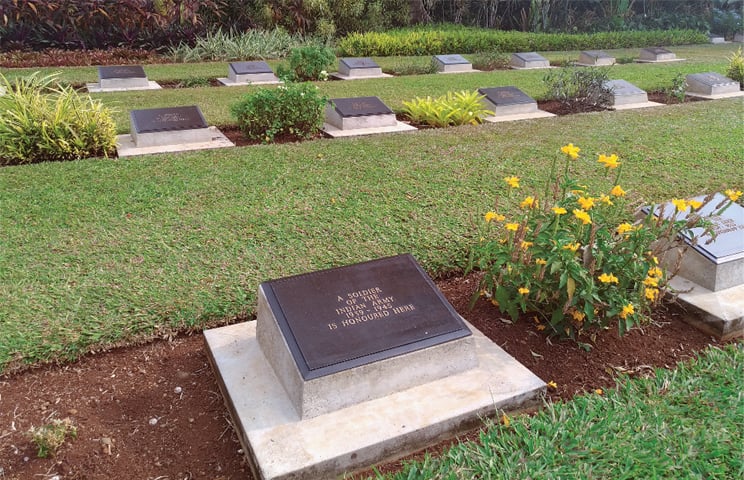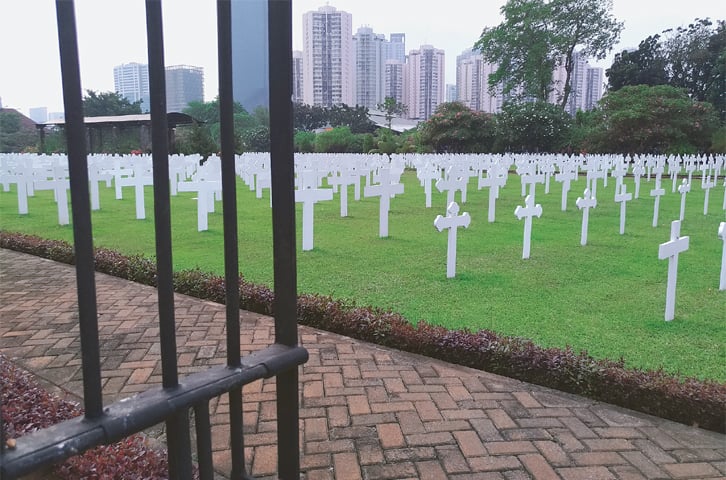Among the rows of wooden crosses standing in the Dutch part of Menteng Pulo Cemetery in Jakarta some are much smaller than others. “These here were kids, very little, killed along their parents,” says a cemetery attendant.
“Who killed them?” I ask.
“War.”
In the Menteng Pulo Cemetery in Jakarta lie some unusual graves of young subcontinental soldiers caught far away from home in an imperial war
He is referring to the Indonesian War of Independence, which raged for four years after the Japanese, who had occupied the Dutch colony, surrendered to British forces at the end of the Second World War.
But alongside these graves are also other graves which catch my eye. They seem out of place. Desi names strike me the most in the Hindu and Sikh section because so many of them lie as unnamed soldiers and, in the Muslim section because so many were teenagers.
The cemetery attendant calls them “kids” or “Pakistani kids” when he refers to boys with Muslim names: 16-year-old Mehndi Khan, a year or two older Muhammad Akbar, Sardar Khan, Siraj Din, Muhammad Sher, Ahmad Khan, Muhammad Sadiq, Yusuf Ali, Rahim Gul, Khan Ali, Bahadur Shah... Who were they? It’s obvious that most of them were Punjabis, especially Jatts, strong and accustomed to hardship. But were they indeed Pakistanis before 1947?
Relatives and officials rarely come to visit the graves. The Hindu and Sikh boys receive slightly more attention, maybe because their nationality seems less ambiguous.

In October last year, a famous and decorated Indian Navy captain arrived to see them all. He seemed kind and modest. He said the visit was a humbling experience but, of course, could not offer anything more than sympathy and respect, for no one could ever say the boys lacked courage. The gallantry of 18-year-old Havaldar Khan Muhammad, for example, had been acknowledged by the British army’s Indian Order of Merit.
For the most part, however, these graves lie forgotten.
***
Near the Red Bridge in Surabaya, East Java, on October 30, 1945, the Commander of the 49th Indian Infantry Brigade, Brigadier A.W.S. Mallaby, was shot to death. He was killed not in combat, as hagiographers would wish, but by a random Indonesian youth who was aiming to strike at what he saw as oppressors. The indiscriminate violence that ensued shaped the course of Indonesia’s freedom struggle.
British-Indian forces were sent by the Allies to accept the surrender of Japan in Indonesia. A Dutch colony since the 17th century, Indonesia was occupied by the Japanese from 1942 until the end of the World War II. The British came to give safe passage to tens of thousands of Europeans and Eurasians who had become Japan’s prisoners of war. Most of them were interned at concentration camps where death rates reached as high as 30 percent.
A few days after Japan’s surrender, on August 17, 1945, Indonesians declared independence. The world ignored them. Another four years would pass and several hundred thousand lives, most of them Indonesian, would be lost before its recognition.
Mallaby himself had not come as an oppressor. Yet, in the days after his death, the British-Indian forces instigated a mass retaliatory action in Surabaya, with land, air and sea strikes killing thousands of independence fighters and civilians. The sacrifices and resistance by the Indonesians eventually made the world realise the national liberation movement was unstoppable. But so too was the violence, especially as the Dutch army was slowly returning to regain control.
The cemetery attendant calls them “kids” or “Pakistani kids” when he refers to boys with Muslim names... Who were they? It’s obvious that most of them were Punjabis, especially Jatts, strong and accustomed to hardship. But were they indeed Pakistanis before 1947?
Provoked by the killing of Mallaby, Indian troops were the first to partake in violence against Indonesians. They did not start it, but they answered fire with more fire. In 1945, no one yet understood that no amount of force and terror could pacify revolutions for national liberation.

There was strong resentment in colonised India against the use of its soldiers in Indonesia. Some British commanders, too, protested. Unlike their government in London, the officers were not supportive of the Netherlands’ colonial rule. Upon arrival they had seen the plight of its people: “Universally barefooted, many clad in rags, and suffering from hideous untreated diseases; living in wretched bamboo huts, earth floored; the filthy canal acts as bath, WC and laundry, all under the town’s gaze … [and] the Dutch declare it was a model colony!”
Some felt they were “clearing the way for waiting Dutch forces, not in freedom’s cause but for imperialism’s ‘oppress and exploit’ policy.” They were dismayed at having been made complicit in oppression. They demanded that the British government send an investigative commission to Java to see “the abyss of disease, squalid misery and ignorance in the streets and market places, which the Dutch imperialists (and British), have caused, countenanced and would perpetuate.”
These grievances were conveyed in a letter to British Foreign Secretary Ernest Bevin, penned by a group of non-commissioned officers in Batavia, now Jakarta. The letter was not graced with a response. These excerpts and a few more come from Richard McMillan’s brilliant dissertation and gripping book The British Occupation of Indonesia, 1945–1946.

Everything about the British presence in the archipelago was ambiguous and eventually brought no real benefit to anyone, especially Britain. In the course of their two-year occupation, the British frequently sided with either the Dutch or the Indonesians. They had vowed to be neutral and, in a sense, they were — by the sum total of their involvement. But more than 1,000 of their soldiers never returned; most of these came from the subcontinent.
Indian soldiers were sympathetic to the Indonesian national cause. The sympathy partly came from a sense of bitterness caused by “the cold foreign, contemptible and disgraceful attitude of Dutch men and women.”
British officers noted that “Since Dutch people do not understand our method of treating all our troops as equals, their attitude was inclined to treat Indians as they do their own locals.” The wretched locals were anything but equal.
It was an accident of history that allowed Europeans to ‘discover’, rob and take away land from those who had a different complexion or slightly flatter noses. In the 20th century, national liberation movements in many parts of the world were driven by a monstrous “cleansing” force devouring those who had humiliated and inflicted suffering on generations of the people they had subdued.
When the Dutch colonial administration and army fled in 1942, the Europeans who remained were locked up by the Japanese in internment camps. Starved and ragged, they would also be condemned by association with the Dutch by certain groups of freedom fighters, irrespective of their political beliefs.
Revolutionary vengeance in the decolonising world was a violence of another kind, ruthless and indiscriminate. To liberate themselves from an inferiority complex, despair and inaction, the oppressed often felt they had to destroy the oppressor, the white man, or those associated with him.
It was in this deformed world that the British forces, with thousands of soldiers enlisted from the subcontinent, had stepped into.
Unlike British soldiers, the Indian boys now lying in these graves were volunteers. Yet, how much free will did these volunteers have? There may have been little freedom in a decision by a young man whose departure for a foreign land could have been his family’s only chance to survive.
Young men from a British colony pitted against young men trying to cast off the shackles of another coloniser were appalled by the acts of sadistic violence they saw in Indonesia. It made their initial sympathy with the Indonesian cause wane. No one had yet foreseen that in less than two years, death-dealing convulsions on a much larger scale would blight their own land. But many of them did not return to witness the partition of India; they were laid to rest in the same memorial park as the slain internees they had come to rescue.
A note from the war diaries of the First Indian Infantry Brigade shows they were anxious about conditions back home. When a famine was looming in Punjab in 1946, all of them agreed to cut their own rations in order that food be sent to India.
Meanwhile, in a faraway land, they were fighting against those who were frantically struggling for their own home and families to be free.
The writer is a Jakarta-based translator, editor and analyst at Concord Consulting Indonesia. She tweets @cukiereczki
Published in Dawn, EOS, March 31st, 2019















































